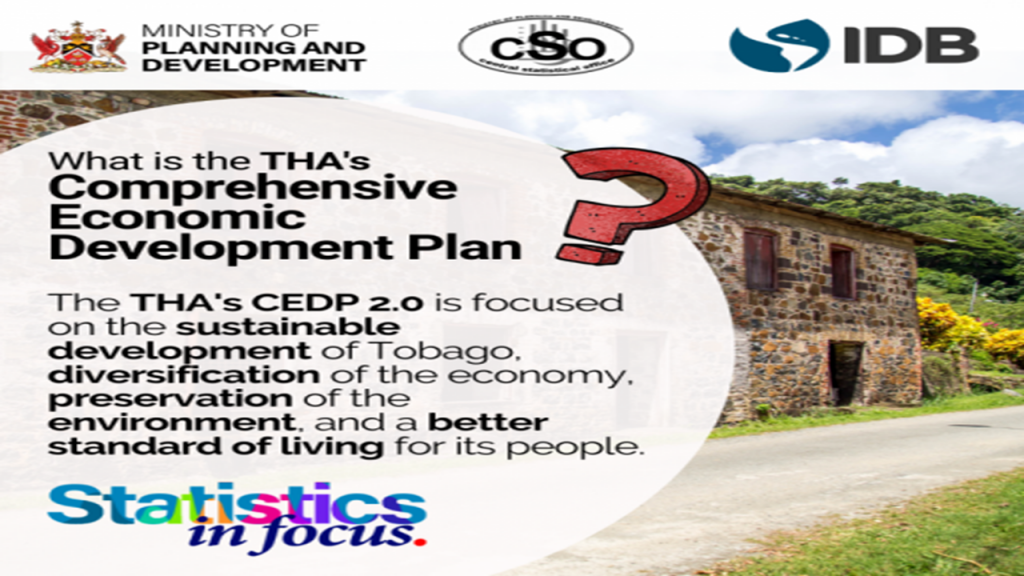Mr. Sean O’Brien, Director of Statistics, Central Statistical Office (CSO) – in a speech given at the commemoration of the 2019 Caribbean Statistics Day observed in Tobago – said the importance of statistics is becoming more apparent to Tobagonians as the Tobago House of Assembly (THA) becomes more independent and is making requests for more statistical data to drive the economy forward.
While data collected by the CSO is collected for the country of Trinidad and Tobago at the national level, the THA requires additional data at the subnational level due to the subtleties of the Tobago economic environment to support the THA’s development plan for Tobago.
The THA’s medium-term strategy for Tobago’s economic development is detailed in the Comprehensive Economic Development Plan (CEDP 2.0). Subsequently, the Executive Council approved the Medium Term Policy and Planning Framework with similar pillars for socio-economic policy focus.
The CEDP 2.0 focused on the sustainable development of Tobago, diversification of the economy, preservation of the environment, and a better standard of living for its people.
“To transform and diversify the Tobago economy such that it is better able to adjust to rapid changes in the national and international economy by producing goods and services in which it can retain a competitive edge” is the overarching goal of the CEDP.
Eight Strategic Priority Areas (SPAs) were identified as necessary toward achieving this goal. They are:
- Branding Tobago: Clean, Green, Safe and Serene
- Good Governance and Institutional Reform
- Business Development and Entrepreneurship
- Human Capital Development
- Improved Infrastructure and Utilities
- Social Development and Resilience
- Enhanced Safety and Security
- Environmental Sustainability
To achieve the goal of diversification of the Tobago economy it is critical that real time, island-specific data and information is available for use by the transformation team.
This is hampered by the lack of Tobago-specific information which continues to be a limiting factor in the decision making process for the development of Tobago.Together with the CSO and other partners, the THA plans to establish an integrated Socio-economic Information Management System (SIMS) and a Geographic Information System (GIS) for Tobago. These systems will help to strengthen Tobago’s capacity to collect and manage data and other forms of statistical information using transparency and collaboration.
While the CSO is the internationally recognized National Statistical Office of Trinidad and Tobago, the THA has a significant role to play in the country’s National Statistical System (NSS). Strengthened statistical capacity in the sister isle serves to empower Tobago’s decision makers to make more targeted economic interventions and implement Tobago specific solutions. The Tobago Economic Census will provide baseline data to support this process.
The THA’s Finance and Enterprise Development Division reports that in 2015, Tobago’s total GDP amounted to TT$1.93bn, a significant increase in recent years. Tourism remains the dominant industry and the single greatest contributor to Tobago’s economy generating demand for a wide range of goods and services. Strengthening sectoral linkages between the tourism, manufacturing, and agricultural industries is expected to enhance business development opportunities and increase employment and income possibilities.
A baseline for such a catalyst was first completed by the Policy Research and Development Institute in 1998 under the direction of Dr. Vanus James with collaborative support from the CSO, then headed by Mr. Dave Clement. This provided support for the justification of a greater share of the national budget as the GDP Equivalent of 850 Million was calculated for Tobago at that time. Since then therefore the Tobago GDP equivalent has doubled.
Economic Censuses are a set of surveys of economic activity undertaken at least every 10 years to establish the statistical benchmark for economic activity in a country. This type of census provides information on business locations, the workforce, and dollars of sales by product and service type. The CSO and the Research Unit of the THA’s Planning Department collaborated to plan such an exercise in Tobago in 2020 but was delayed due to the COVID 19 pandemic.
The Economic Census in Tobago will cover a range of data related to the Tobago Economy – this will include data such as: –
- Total Number of Establishments;
- Value of Sales,
- Shipments,
- Revenue;
- Primary Business Activity;
- Total Number of Employees;
- Total Annual Payroll;
- Total First Quarter Payroll; and
- industry specific statistics
The data collected will then be used to develop sub national profiles of economic indicators for Tobago in the area of
- domestic production
- retail prices
- producer prices
- retail sales
This data will support the customization of policy and strategic planning for the THA as it charts the way forward with regard to the development of Tobago.
In this regard, the continued collaboration between agencies and the adoption of the Memorandum of Understanding between the CSO and the Research Unit of the Planning Department of the THA will serve to not only strengthen the Research capacity of the THA as part of the National Statistical System, but provide a decentralized and empowered model for the gathering of statistics in Tobago that will serve the island of Tobago’s unique needs while bolstering the statistics infrastructure of the country. Other areas for which the THA has policy responsibility from its Fifth Schedule will now also benefit and be able to facilitate data-driven development.
Author: Central Statistical Office

